February 2024

We create avenues for the industry to gain more insights into emerging trends, industry-specific problems of national importance, and global best practices in logistics & supply chain management. We enable the industry to cut down transaction costs, increase efficiency, and enhance profitability. We are committed to sensitizing the industry about macro-level issues and helping find solutions to them.
News highlights from the world of supply chain and logistics that appeared in media over the last one month
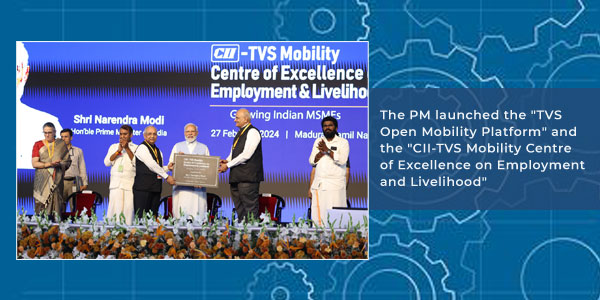
|
| Prime Minister Shri Narendra Modi, speaking in Madurai at a programme titled "Creating the Future – Digital Mobility for Automotive MSME Entrepreneurs," said that India’s MSMEs have a great opportunity to become a strong part of the global supply chain. He called upon entrepreneurs to enhance their capacity to address the growing global demand for electric vehicles, reported the Times of India newspaper. The PM launched the "TVS Open Mobility Platform" and the "CII-TVS Mobility Centre of Excellence on Employment and Livelihood" – two major initiatives developed to support India's automotive sector MSMEs. |
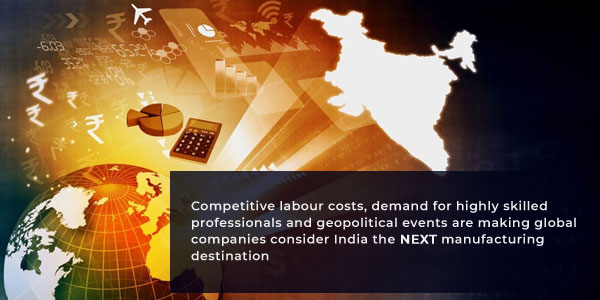
|
| A recent PwC India report titled "The India Opportunity: Developing Resilient Electronics Supply Chains" stated that factors like competitive labour costs, demand for highly skilled professionals and geopolitical events are making global companies consider India the "next" manufacturing destination. The report noted that pandemic and geopolitical shifts have disrupted global supply chains, exposing the global economy's vulnerability. However, India's Electronics System Design and Manufacturing sector has emerged as a high-growth industry due to its competitive advantages. India must invest in infrastructure and policy solutions and adopt a multi-faceted approach to ensure a reliable supply chain. This will help mitigate risks associated with geopolitical uncertainties and make India an attractive manufacturing destination. |
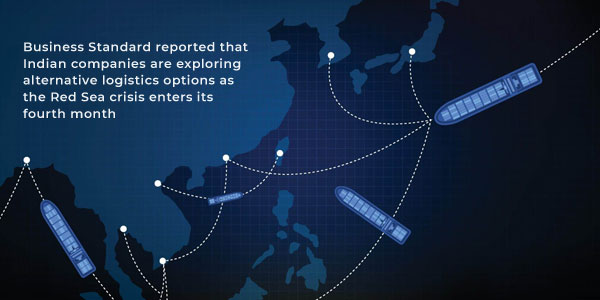
|
| Business Standard reported that Indian companies are exploring alternative logistics options as the Red Sea crisis enters its fourth month. The Red Sea crisis is a supply chain disruption that began in October 2023 as a result of attacks by Houthi rebels in Yemen on cargo ships and tankers. Due to transit-time delays and rising shipping and insurance costs, many companies have taken proactive measures to minimise the impact on their operations. These measures include creating a reserve of extra working capital, stockpiling raw materials, and exploring alternative logistics options, such as searching for different shipping routes. |
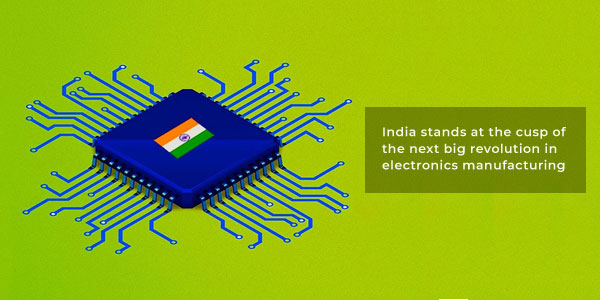
|
| Josh Foulger, the former country head of Bharat FIH – the Indian arm of Foxconn – and the incoming president of electronics at Bangalore-based manufacturing firm Zetwerk, India, told the Economic Times that India stands at the cusp of the next big revolution in electronics manufacturing. He called the present juncture the “Y2K moment” for the country. “India is going to be a full stack player. We can design, do manufacturing and also be a supply chain player. We can design, develop, test and market products in our home domain and then do an India plus,” he said. He added that the country is poised to be “one of the best pivots” for the global consumer electronics supply chain as it has pursued the right policies in the right direction. |
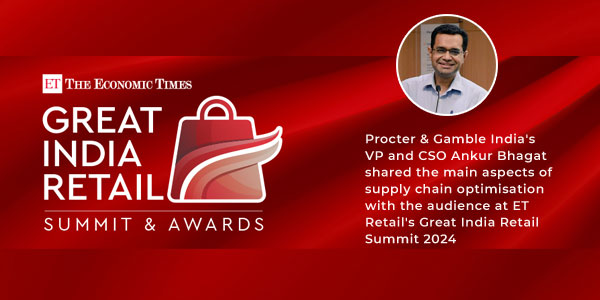
|
| Procter & Gamble India's VP and CSO Ankur Bhagat shared the main aspects of supply chain optimisation with the audience at ET Retail's Great India Retail Summit 2024. He said that the demand for consumer products is everchanging. He added that his team has a framework for evaluating the fast-changing consumer demand because channels, consumer habits, and SKUs would change. Agility is needed to respond to that demand in the organisation’s spirit of continuous improvement. "Our philosophy is constructive disruption, ensuring we continue to have a competitive advantage. What helps us in addressing some of this is our ability to leverage technology to our advantage," he said. |
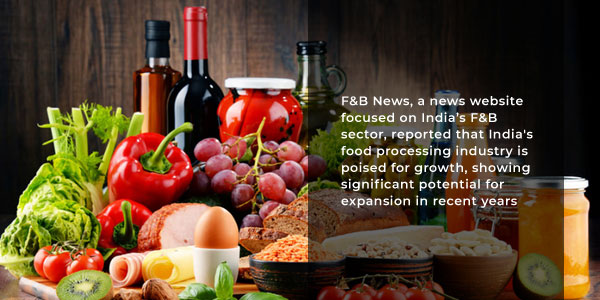
|
| F&B News, a news website focused on India’s F&B sector, reported that India's food processing industry is poised for growth, showing significant potential for expansion in recent years. The article noted that the sector can contribute to the economy's growth by attracting investments, promoting exports, and reducing post-harvest losses. Some of the top sectors that form part of the food processing industry in India include processed fruits and vegetables, ready-to-eat and ready-to-cook foods, processed marine products, edible oils, beverages, and dairy products. “Overall, the expansion of the Indian food processing industry presents exciting opportunities for both businesses and consumers, and it can play a significant role in India's economic development and food security goals,” said Chetan Hanchate, food consultant and Head of Centre for Processed Foods to the news portal. |
INTERNATIONAL
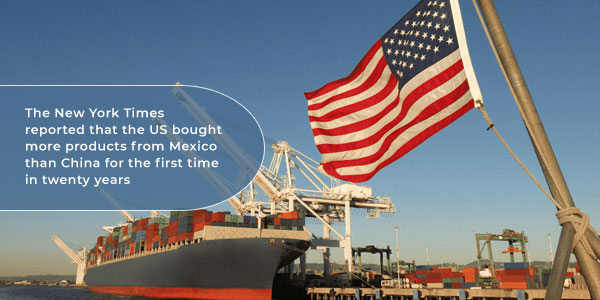
|
| The New York Times reported that the US bought more products from Mexico than China for the first time in twenty years. The newspaper called it a sign of the shifting global trade patterns. One reason was easing the pandemic-induced demand in America for Chinese products. It also provided “compelling evidence”, stated the paper, that years of heightened tensions have significantly impacted the U.S.-China trade.“We are decoupling, and that’s weighing heavily on trade flows,” Moody’s Analytics chief economist Mark Zandi told the NYT about the United States' trade relationship with China. |
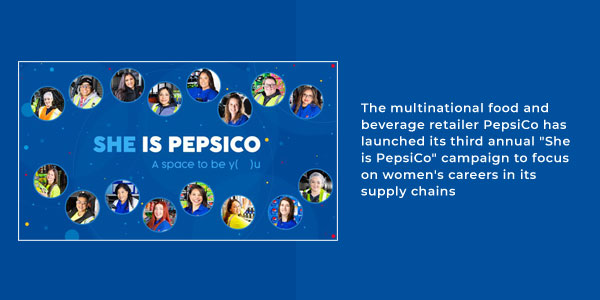
|
| The multinational food and beverage retailer PepsiCo has launched its third annual "She is PepsiCo" campaign to focus on women's careers in its supply chains. One of the campaign's chief objectives is to encourage women to pursue careers within the company's supply chains and recognise the significant contributions of women in frontline roles. The programme began in the US in 2022 and has now expanded to global markets. Since its inception, the campaign has resulted in a 6 per cent increase in female applicants for frontline roles at PepsiCo Beverages North America, according to the news report. |
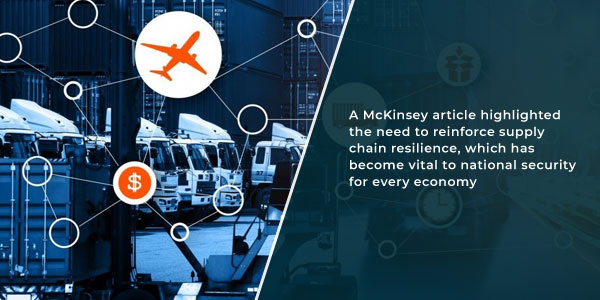
|
| A McKinsey article highlighted the need to reinforce supply chain resilience, which has become vital to national security for every economy. The article cited a recent McKinsey Global Institute about global trade flows to show the significant extent to which all regions are mutually dependent for production and trade. The article stated that the pandemicand the geopolitical conflicts have exposed how global interconnectedness can cause regional disruptions with far-reaching consequences. As an example, the reduction in semiconductor chip production in Asia due to the pandemic and supply chain disruptions had a ripple effect on automakers in Europe and the United States. In the coming decades, vulnerabilities in connected supply chains can pose significant challenges to every country's economic and national security, it posited. |
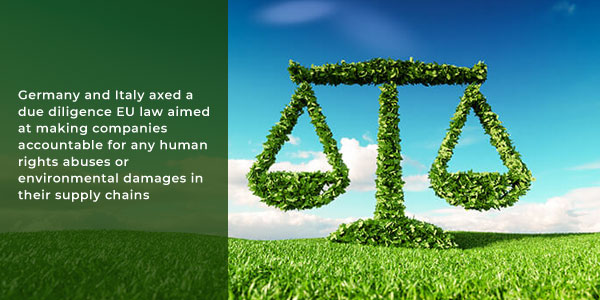
|
| Financial Times reported that Germany and Italy axed a due diligence EU law aimed at making companies accountable for any human rights abuses or environmental damages in their supply chains. The law would have also allowed activists to take legal action against businesses for the harm they cause. The objections from Germany and Italy reflected concerns that the new legislation could hurt their industrial base. Reports of human rights abuses in the Chinese region of Xinjianghave become a critical issue for German chemical maker BASF and car maker Volkswagen. |
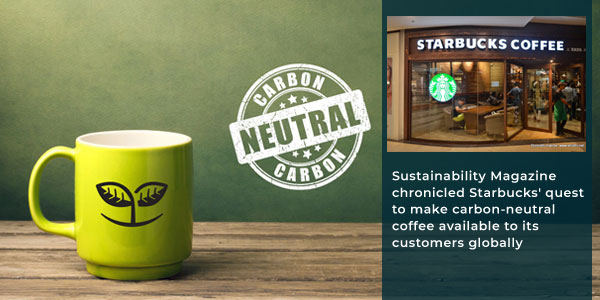
|
| Sustainability Magazine chronicled Starbucks' quest to make carbon-neutral coffee available to its customers globally. The demand for coffee has increased by 50 per cent in the last three decades, and it is estimated that three billion cups of coffee are consumed worldwide daily. The magazine highlighted that with the increase in consumption by about 50 per cent in the last three decades, coffee production's environmental and social impact has also increased, with issues such as deforestation and non-ethical labour practices becoming growing areas of concern. However, the coffee industry is beginning to make a positive change. Companies like Starbucks are greening their coffee supply chains as consumers demand more environmentally friendly products, and governments are implementing legislation to increase sustainability. "From restoring forests to educating farmers, Starbucks is delivering bold solutions," the publication quoted Michelle Burns, EVP Global Coffee, Social Impact & Sustainability, on the subject. |

|
| A Technology Magazine feature averred that the ongoing upturn in the manufacturing of semiconductors could impact technology supply chains worldwide. The magazine cited a Bloomberg Intelligence report to state that the augmented chipmaking efforts of the US and Europe, given the semiconductors' fast-growing role in wartime tech as well as work-critical devices, could lift their combined market shares from the current 19 per cent to as high as 45 per cent by 2032. The article stated that global technology supply chains are shifting priorities from profitability and efficiency towards supply chain independence, leading to geographical diversification. However, the semiconductor sector may face more challenges than opportunities due to this shift. |
|
Interview of the Month
|
|
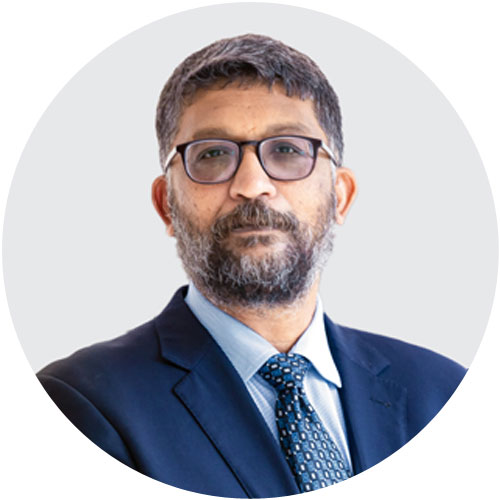
|
Mr. Rampraveen Swaminathan, Managing Director & CEO, Mahindra Logistics Limited
|
| CII Institute of Logistics organized the 18th edition of "Automotive Supply Chain" conference on 21 February 2024 in New Delhi. Thought leaders from the government and the industry such as yourself discussed key issues pertaining to the theme "Embracing growth and evolution." As more international companies and economies expand their manufacturing and supply chain presence in India, how well-prepared and adaptable the country's logistics ecosystem is to embrace this growth? Are there any areas where the logistics industry could improve to better support and facilitate this evolution? |
| India's logistics ecosystem has made significant strides in preparation for the growth of international companies and economies expanding their manufacturing and supply chain presence in the country. From a macro perspective, the demand and sentiment for macros are strong, indicating a favorable environment for growth. With India's automotive sector poised for growth, as evidenced by its significant contribution of 7.1% to the country's GDP and accounting for 49% of the manufacturing GDP, there is a clear need for a robust logistics infrastructure. However, challenges persist. For instance, India's logistics costs as a percentage of GDP are still higher than those in developed countries, indicating room for improvement in efficiency and cost-effectiveness. Moreover, the recent surge in imports of automobile components highlights the need for the logistics industry to adapt quickly to the changing global dynamics. Areas of improvement include investing in infrastructure development, such as roadways, ports, and warehousing facilities, as well as enhancing technology adoption, such as automation and digitalization, to streamline operations and improve supply chain visibility and efficiency. |
| Automotive is the biggest manufacturing vertical in the country from every aspect, be it the expanse of the supplier ecosystem, employment generation, or technological adoption. However, large size can be a disadvantage when adapting to change. At a time when the global automotive industry is changing fast with the rise of EVs, green tech, and autonomous cars, how do you see the Indian auto industry keeping pace? |
| In the context of the rapidly changing landscape of the global automotive industry, especially with the emergence of electric vehicles, green technology, and autonomous cars, the pressure to shift away from ICE vehicles beyond decarbonisation is impacting both product categories and their life cycles. India's commitment to climate change was underscored during the COP27 conference in Egypt in 2022, where the country ranked globally among the top five in climate change performance. This emphasis on environmental responsibility aligns with the promotion of green transportation, which mitigates the effects of climate change and improves air quality, reinforcing India's commitment to climate protection. The future of mobility, today, is all – hybrid, hydrogen, and electric. To fully realize the potential of EVs in India, integration with renewable energy sources such as solar and wind can be explored. This helps reduce the carbon footprint of transportation and synchronizes with India's broader transition to a more sustainable energy future. We have India's largest operating EV fleet with close to 2000 vehicles, including three-wheelers and four-wheelers.At Mahindra Logistics, we have made the biggest shift by focusing on cost-to-win than cost-to-service due to shrinking product lifecycles and rapid technological changes, transitioning towards electric vehicles, and investing in reducing SCOPE 3 emissions to support environmental initiatives. |
| Much like semiconductors and pharma, the automotive industry survives and thrives on a supply chain spanning the globe. What key supply chain capabilities companies in the Indian automotive sector must develop and hone to compete in the markets here and abroad? |
| To compete effectively in both domestic and international markets, companies in the Indian automotive sector must strongly develop key supply chain capabilities including investing in advanced technologies such as automation, digitalization, and predictive analytics to enhance, visibility, agility along with efficiency across the supply chain. Industry trends like digitization and mass customization are reshaping customer requirements, posing challenges for OEMs in adapting to these changes. The fragility of global supply chains underscores the importance of supply chain variability.Thus, strategic collaboration, both within India and across borders, is crucial for ensuring responsiveness to market demands. In addition to this, supply chain integration is essential, with technology aiding in forecasting while realising the importance of physically moving the products around. For Mahindra Logistics, priority lies in optimizing multimodal supply chains, FTL and PTL while integrating our warehouses and in-plant logistics for driving efficiency. Additionally, we are expanding our capacity by adding warehousing infrastructure across three major automotive clusters, including a million square feet in North India, four square feet in Maharashtra regions, and significant expansion in Southern India. At Mahindra Logistics, we emphasize upon the importance of agility, focus, talent acquisition and technology to manage transitions, capital allocation, and cost efficiency. |
| In the recent past, many experts and sector publications have blamed lean management practices for making the automotive industry too lean to deal with sudden shortages like the ones we saw during and immediately after the pandemic. Do you feel that this has been the case? How can automotive companies strike the right balance between efficiency and resilience from a supply chain perspective? |
| Enhancing supply chain efficiency involves minimizing lead times, reducing inventory shrinkage, and accelerating material turnaround, with the potential to achieve cost reductions of up to 15-16% in the inbound-to-manufacturing supply chain. Automotive companies today must reassess their supply chains; especially by evaluating global sourcing strategies to mitigate risks and dependability.Another critical aspect is inventory management. Many companies operate on a just-in-time principle, maintaining minimal inventory at plants. However, during the pandemic, transportation disruptions and labor issues among suppliers forced companies to resort to costly airlifting of components to sustain assembly lines. Hence, there is a need for the auto companies to re-evaluate their entire supply chains, including inventory management practices. |
| From the perspective of the CEO of one of the country’s leading 3PLs, what is the biggest positive trend that you feel India’s logistics industry is experiencing and how can supply chain organizations benefit from it? |
| It’s important to note that efficient "Move in India" initiatives are critical to support the "Make in India" endeavour. Aligned to this, the supply chain of the future will change. The shift towards electric as well as prioritizing decarbonization and sustainability will form the basis of a resourceful supply chain operation. Global transformations as well as surge in uncertainty post pandemic requires numerous B2B enterprises, including ours, to transition from a "cost-to-serve" to a "cost to win" approach. This shift is driven by three primary factors. First is heightened demand propelled by robust growth in tier two and tier three cities; secondly, evolving customer behaviour that has made demand increasingly omnichannel, spanning online, modern trade, and general trade, necessitating enterprises to adjust their supply chains and accommodate these ever changing dynamics. Third significant driver is a government-driven surge in infrastructure development, encompassing physical infrastructure expansions like roads and direct freight corridors, as well as digital assets such as ONDC, akin to the transformative impact of UPI in the financial services sector. Furthermore, sustainability has gained prominence, with 'E' (environmental) emerging as a significant consideration alongside 'S' (social) and 'G' (governance). In response, customers are seeking integrated services from single entities that assume responsibility for integrating these services and managing associated risks. Technology has become ubiquitous, with machine learning, AI, and automation technologies tailored to industry needs and industries are required to leverage it to their advantage. Companies are significantly investing in infrastructure and enhancing quality to address these evolving needs. At Mahindra Logistics, we have four million sq. ft. of capacity certified by IGBC as Gold or Platinum. |
We will connect again next month, with a comprehensive dossier of news, trends and events from the industry.
| Courtesy: Newsletter content developed by Mr. Aanand Pandey | ||